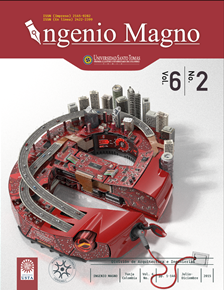Development of a model for the integration of web 2.0 services based on education 3.0
Main Article Content
Abstract
Downloads
Article Details
DECLARATION OF ORGINIALITY OF SUBMITTED ARTICLE
With this document, I/We certify that the article submitted for possible publication in the institutional journal INGENIO MAGNO of the Research Center Alberto Magno CIIAM of the University Santo Tomás, Tunja campus, is entirely of my(our) own writing, and is a product of my(our) direct intellectual contribution to knowledge.
All data and references to completed publications are duly identified with their respective bibliographical entries and in the citations thus highlighted. If any adjustment or correction is needed, I(we) will contact the journal authorities in advance.
Due to that stated above, I(we) declare that the entirety of the submitted material is in accordance with applicable laws regarding intellectual and industrial property, and therefore, I(we) hold myself(ourselves) responsible for any complaint related to it.
If the submitted article is published, I(we) declare that I(we) fully relinquish publishing rights of the article to the University Santo Tomás, Tunja campus. As remuneration for this relinquishment of rights, I(we) declare my(our) agreement to receive two (2) copies of the edition of the journal in which my(our) article appears.
References
Cobcroft, R., Towers, S., Smith, J. y Bruns, A. (2006). Mobile learning in review: opportunities and challenges for learners, teachers, and institutions. Brisbane: Queensland University of Technology.
Congreso de la República de Colombia (1994). Ley 115 de 11994, por la cual se expide la Ley General de Educación. Diario Oficial 41.214.
Días, C. y Gauna E. (2014). Cambio en las estrategias de enseñanza-aprendizaje para la nueva Generación Z o de los “nativos digitales” [reposital]. Ciudad de México: Universidad Nacional Autónoma de México.
Felicísimo, A. M. (2004). Conceptos básicos, modelos y simulación. Introducción y aplicaciones a las ciencias ambientales. Oviedo: Pentalfa.
Keats, D. y Schmidt, J. P. (2007). The genesis ang emergence of Education 3.0 in higher education and its potential for Africa. Recuperado de http://firstmonday. org/ojs/index.php/fm/article/view/1625/1540
Ministerio de Educación Nacional (2005). Enseñar con tecnología. Recuperado de http://www.colombiaaprende. edu.co/html/docentes/1596/article-88443.html
Ministerio de Educación Nacional de (2006a). Estándares básicos de competencias. Bogotá: Autor.
Ministerio de Educación Nacional (2006b). Plan Nacional Decenal de Educación 2006-2016. Bogotá: Autor.
Ministerio de Educación Nacional (2011). Encuesta Nacional de Deserción Estudiantil (ENDE). Recuperado de http://www.mineducacion.gov. co/1621/articles-293672_archivo_pdf_presentacion.pdf Ministerio de Educación Nacional (2012). Lineamientos curriculares. Recuperado de http:// www.mineducacion.gov.co/1621/article-80860.html Mohammed Abdul, F. J. y Ramírez, Velarded, R. (2009). Herramientas web 2.0 para el aprendizaje colaborativo. Recuperado de http://remo.det.uvigo.es/ solite/attachments/038_Web%202.0.pdf
Molina Ramírez, J. R. (2011, 3 de mayo). Ponen en marcha la Educación 3.0 en Cartagena. El Universal, p. 12. Recuperado de http://www.eluniversal.com.co/ cartagena/educacion/ponen-en-marcha-la-educacion30-en-cartagena-22195
Musser, J. y O’Reilly, T. (2006). Web 2.0 principles and best practices. Recuperado de http://radar.oreilly. com/2006/11/web-20-principles-and-best-pra.html
Navarro, M. y Martínez de Anguita, P. (2008). Evaluación de un modelo Blend-learning de educación para el desarrollo rural adaptado a la realidad colombiana. Revista Iberoamericana de Educación, 45, 2-11.
Ortiz Ocaña, A. (2012). Pedagogía de la educación superior y docencia universitaria. Barranquilla: Cepedid.
Paskevicius, M. (2011). The potential for education 3.0 in a developing context using giddens ’ structuration theory. Recuperado de http://bluelightdistrict.org/wp/wp-content/ uploads/2010/08/mpaskevi_Research_Paper_v2.pdf
Sharples, M., Taylor, J. y Vavoula, G. (2005). Towards a theory of mobile learning. Recuperado de http://www.mlearn.org.za/CD/papers/Sharples.pdf

